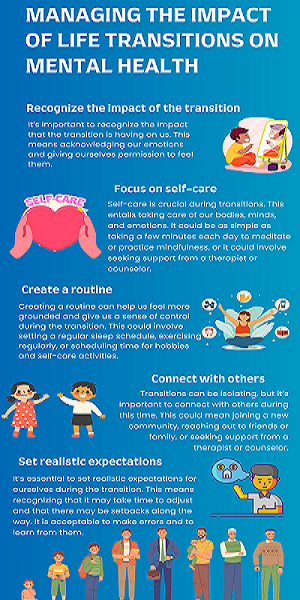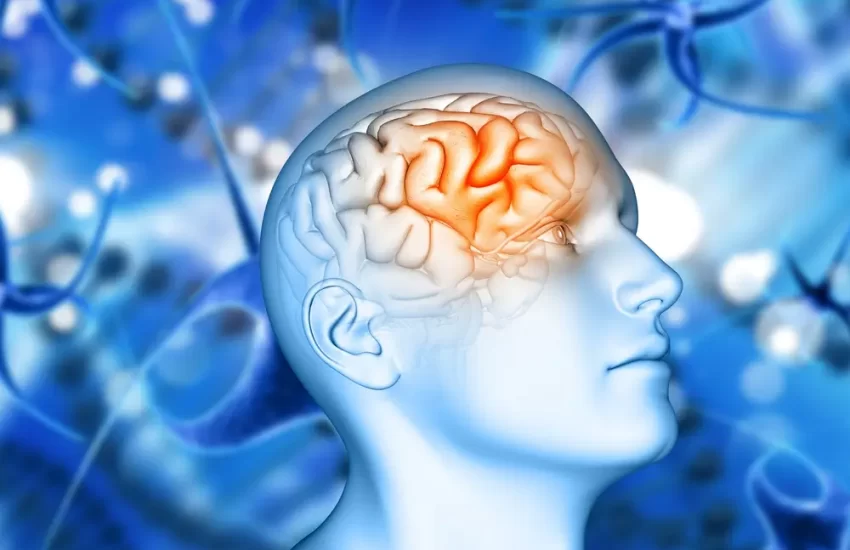Life transitions can be both exciting and challenging. They often come with a sense of new beginnings, but they can also bring uncertainty and stress. Whether it’s starting a new job, moving to a new city, or going through a major life change like getting married or having a baby, transitions can impact our mental health in a variety of ways.
Life is full of transitions, both positive and negative, that can greatly impact an individual’s mental health. These transitions can be major life events such as the loss of a loved one, a new job, or moving to a new city. They can also be smaller changes such as graduating from school, starting a new hobby, or ending a relationship. While some transitions can be exciting and lead to personal growth, others can be stressful and challenging. It is important to understand how these transitions can affect mental health and learn strategies for managing their impact. This topic is particularly relevant in today’s society, as many people are experiencing significant life transitions due to the ongoing COVID-19 pandemic. This article will explore the impact of life transitions on mental health, provide tips for managing these transitions, and highlight the importance of seeking professional help when needed.
Understanding the Impact of Life Transitions on Mental Health
Transitions can cause stress, which can have adverse effects on our mental health. Stress is a natural response to change, but it can be overwhelming and cause anxiety, depression, and other mental health issues.
Transitions can also bring about feelings of uncertainty and loss. We may feel like we’re leaving behind a part of our identity, or like we’re unsure of what the future holds. This can lead to feelings of sadness, grief, or even anger.
Transitions can also disrupt our daily routines and habits. This can lead to feelings of disorientation and confusion, making it difficult to adjust to the new changes.
Life transitions are events or changes that occur in our lives, such as starting a new job, moving to a new city, getting married, or experiencing the loss of a loved one. These transitions can have a significant impact on our mental health and well-being. Here are some points to understand the impact of life transitions on mental health:
- Life transitions can be stressful: Life transitions can cause stress, anxiety, and uncertainty. These changes can disrupt our daily routines and force us to adapt to new situations, which can be challenging.
- Different transitions can have different effects: The impact of life transitions on mental health can vary depending on the type of transition. For example, positive transitions such as getting married or having a child can still cause stress and adjustment issues, while negative transitions such as job loss or divorce can be more challenging to cope with.
- Timing and duration matter: The timing and duration of life transitions can also impact our mental health. For example, if a transition occurs during a particularly stressful period, it may be more difficult to cope with. Similarly, if a transition lasts for an extended period, it can take a toll on our mental health.
- Coping strategies are important: Coping strategies are essential in managing the impact of life transitions on mental health. Seeking social support, practicing self-care, and engaging in stress-reducing activities can help individuals navigate life transitions in a healthy way.
- Mental health issues may arise: Life transitions can trigger the onset of mental health issues or exacerbate existing ones. It’s essential to seek professional help if you’re experiencing symptoms such as depression, anxiety, or stress that you’re unable to manage on your own.
- Resilience can be built: While life transitions can be challenging, they can also offer opportunities for growth and resilience-building. By learning to adapt to change and practicing coping strategies, individuals can develop resilience and improve their overall mental health and well-being.
Managing the Impact of Life Transitions on Mental Health

While transitions can be challenging, there are things we can do to manage their impact on our mental health.
Life transitions can have a significant impact on mental health. Even positive life events such as getting married or having a child can be stressful and cause anxiety. Negative life events, such as the loss of a loved one, can trigger feelings of grief and depression.
During life transitions, individuals may experience a range of emotions, including stress, anxiety, sadness, and even excitement. These emotions are normal and natural, but if they persist and interfere with daily life, it may be a sign of a mental health issue.
Additionally, life transitions can trigger existing mental health conditions such as depression and anxiety. For example, someone who has a history of depression may experience a relapse during a difficult life transition such as a divorce.
Understanding the impact of life transitions on mental health is essential for recognizing when it is time to seek help. Many people feel ashamed or embarrassed to seek help for mental health issues, but it is important to remember that seeking help is a sign of strength.
- Recognize the impact of the transition
It’s important to recognize the impact that the transition is having on us. This means acknowledging our emotions and giving ourselves permission to feel them. We should also be mindful of any changes in our behavior or mental health and seek help if necessary.
- Focus on self-care
Self-care is crucial during transitions. This entails taking care of our bodies, minds, and emotions. It could be as simple as taking a few minutes each day to meditate or practice mindfulness, or it could involve seeking support from a therapist or counselor.
- Create a routine
Creating a routine can help us feel more grounded and give us a sense of control during the transition. This could involve setting a regular sleep schedule, exercising regularly, or scheduling time for hobbies and self-care activities.
- Connect with others
Transitions can be isolating, but it’s important to connect with others during this time. This could mean joining a new community, reaching out to friends or family, or seeking support from a therapist or counselor.
- Set realistic expectations
It’s essential to set realistic expectations for ourselves during the transition. This means recognizing that it may take time to adjust and that there may be setbacks along the way. It is acceptable to make errors and to learn from them.
Examples of Life Transitions and their Impact on Mental Health
Here are some common life transitions and how they can impact our mental health:
- Starting a new job
While it can be exciting to start a new job, it can also be stressful. We may feel pressure to perform well and make a good impression. This can lead to anxiety and imposter syndrome.
- Moving to a new city
Moving to a new city can be a fresh start, but it can also be isolating. We may miss our friends and family and struggle to find a new community. Depression and feelings of loneliness can result from this.
- Going through a divorce
Experiencing a divorce can be a difficult experience. We may feel a sense of loss and grief, as well as anxiety about the future. This can lead to depression and post-traumatic stress disorder (PTSD).
- Starting a family
Starting a family can be an exciting time, but it can also be overwhelming. We may feel pressure to be a perfect parents and struggle with the changes to our identity.

Conclusion
Life transitions are inevitable, and they can have a significant impact on mental health. Understanding the impact of life transitions on mental health and managing this impact is crucial for overall well-being. It is essential to practice self-care, seek support, stay positive, practice mindfulness, and seek professional help when needed. Remember that seeking help is a sign of strength, and there is no shame in asking for help when you need it.
Faq’s
Q: What are life transitions?
A: Life transitions are major changes that occur in a person’s life, such as graduating from college, starting a new job, getting married, having a child, or experiencing the death of a loved one. These transitions can be both positive and negative and can have a significant impact on a person’s mental health.
Q: What is the impact of life transitions on mental health?
A: Life transitions can cause stress, anxiety, and depression, especially if they are unexpected or unwanted. People may feel overwhelmed by the changes they are experiencing and struggle to adjust to their new circumstances. However, life transitions can also provide opportunities for personal growth and development.
Q: How can I manage the impact of life transitions on my mental health?
A: There are several strategies that can help you manage the impact of life transitions on your mental health, including seeking support from friends and family, practicing self-care, maintaining a healthy lifestyle, seeking professional help, and practicing mindfulness and relaxation techniques.
Q: What is an adjustment disorder?
A: An adjustment disorder is a type of mental health condition that occurs when a person has difficulty adjusting to a major life change, such as a divorce, job loss, or illness. Symptoms may include feelings of sadness, anxiety, and hopelessness, as well as physical symptoms such as headaches, fatigue, and digestive problems.
Q: When should I seek professional help for mental health issues related to life transitions?
A: You should seek professional help if you are experiencing significant distress or impairment as a result of a life transition. Symptoms that may warrant seeking help include persistent feelings of sadness or anxiety, changes in sleep or appetite, social withdrawal, and difficulty functioning at work or in other areas of your life.
